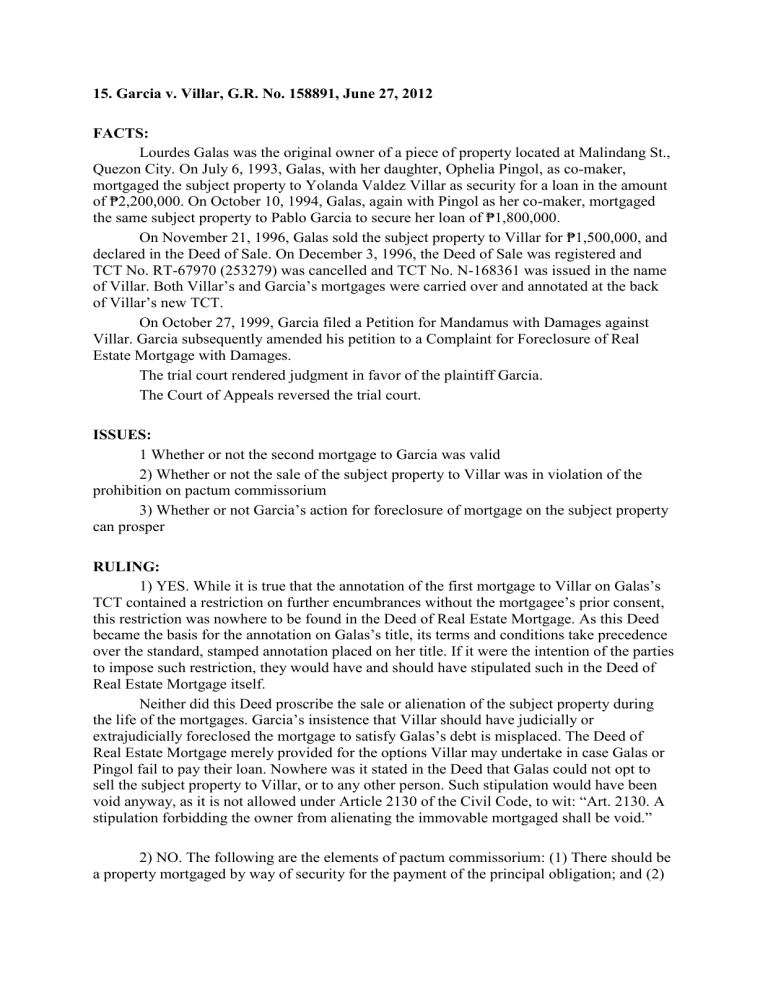
15. Garcia v. Villar, G.R. No. 158891, June 27, 2012 FACTS: Lourdes Galas was the original owner of a piece of property located at Malindang St., Quezon City. On July 6, 1993, Galas, with her daughter, Ophelia Pingol, as co-maker, mortgaged the subject property to Yolanda Valdez Villar as security for a loan in the amount of ₱2,200,000. On October 10, 1994, Galas, again with Pingol as her co-maker, mortgaged the same subject property to Pablo Garcia to secure her loan of ₱1,800,000. On November 21, 1996, Galas sold the subject property to Villar for ₱1,500,000, and declared in the Deed of Sale. On December 3, 1996, the Deed of Sale was registered and TCT No. RT-67970 (253279) was cancelled and TCT No. N-168361 was issued in the name of Villar. Both Villar’s and Garcia’s mortgages were carried over and annotated at the back of Villar’s new TCT. On October 27, 1999, Garcia filed a Petition for Mandamus with Damages against Villar. Garcia subsequently amended his petition to a Complaint for Foreclosure of Real Estate Mortgage with Damages. The trial court rendered judgment in favor of the plaintiff Garcia. The Court of Appeals reversed the trial court. ISSUES: 1 Whether or not the second mortgage to Garcia was valid 2) Whether or not the sale of the subject property to Villar was in violation of the prohibition on pactum commissorium 3) Whether or not Garcia’s action for foreclosure of mortgage on the subject property can prosper RULING: 1) YES. While it is true that the annotation of the first mortgage to Villar on Galas’s TCT contained a restriction on further encumbrances without the mortgagee’s prior consent, this restriction was nowhere to be found in the Deed of Real Estate Mortgage. As this Deed became the basis for the annotation on Galas’s title, its terms and conditions take precedence over the standard, stamped annotation placed on her title. If it were the intention of the parties to impose such restriction, they would have and should have stipulated such in the Deed of Real Estate Mortgage itself. Neither did this Deed proscribe the sale or alienation of the subject property during the life of the mortgages. Garcia’s insistence that Villar should have judicially or extrajudicially foreclosed the mortgage to satisfy Galas’s debt is misplaced. The Deed of Real Estate Mortgage merely provided for the options Villar may undertake in case Galas or Pingol fail to pay their loan. Nowhere was it stated in the Deed that Galas could not opt to sell the subject property to Villar, or to any other person. Such stipulation would have been void anyway, as it is not allowed under Article 2130 of the Civil Code, to wit: “Art. 2130. A stipulation forbidding the owner from alienating the immovable mortgaged shall be void.” 2) NO. The following are the elements of pactum commissorium: (1) There should be a property mortgaged by way of security for the payment of the principal obligation; and (2) There should be a stipulation for automatic appropriation by the creditor of the thing mortgaged in case of non-payment of the principal obligation within the stipulated period. Villar’s purchase of the subject property did not violate the prohibition on pactum commissorium. The power of attorney provision above did not provide that the ownership over the subject property would automatically pass to Villar upon Galas’s failure to pay the loan on time. What it granted was the mere appointment of Villar as attorney-in-fact, with authority to sell or otherwise dispose of the subject property, and to apply the proceeds to the payment of the loan. This provision is in conformity with Article 2087, which reads: Art. 2087. It is also of the essence of these contracts that when the principal obligation becomes due, the things in which the pledge or mortgage consists may be alienated for the payment to the creditor. Galas’s decision to eventually sell the subject property to Villar for an additional ₱1,500,000 was well within the scope of her rights as the owner of the subject property. The subject property was transferred to Villar by virtue of another and separate contract, which is the Deed of Sale. 3) NO. The real nature of a mortgage is described in Article 2126 of the Civil Code, to wit: Art. 2126. The mortgage directly and immediately subjects the property upon which it is imposed, whoever the possessor may be, to the fulfillment of the obligation for whose security it was constituted. Simply put, a mortgage is a real right, which follows the property, even after subsequent transfers by the mortgagor. "A registered mortgage lien is considered inseparable from the property inasmuch as it is a right in rem." The sale or transfer of the mortgaged property cannot affect or release the mortgage; thus the purchaser or transferee is necessarily bound to acknowledge and respect the encumbrance. In fact, under Article 2129, the mortgage on the property may still be foreclosed despite the transfer, viz: Art. 2129. The creditor may claim from a third person in possession of the mortgaged property, the payment of the part of the credit secured by the property which said third person possesses, in terms and with the formalities which the law establishes. While we agree with Garcia that since the second mortgage, of which he is the mortgagee, has not yet been discharged, we find that said mortgage subsists and is still enforceable. However, Villar, in buying the subject property with notice that it was mortgaged, only undertook to pay such mortgage or allow the subject property to be sold upon failure of the mortgage creditor to obtain payment from the principal debtor once the debt matures. Villar did not obligate herself to replace the debtor in the principal obligation, and could not do so in law without the creditor’s consent. Article 1293 provides: Art. 1293. Novation which consists in substituting a new debtor in the place of the original one, may be made even without the knowledge or against the will of the latter, but not without the consent of the creditor. Payment by the new debtor gives him the rights mentioned in articles 1236 and 1237. In view of the foregoing, Garcia has no cause of action against Villar in the absence of evidence to show that the second mortgage executed in favor of Garcia has been violated by his debtors, Galas and Pingol, i.e., specifically that Garcia has made a demand on said debtors for the payment of the obligation secured by the second mortgage and they have failed to pay.




